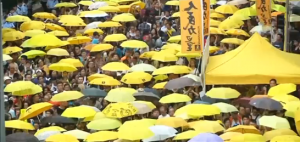
(Reuters) — About 1,000 pro-democracy activists rallied outside Hong Kong government headquarters on Monday (September 28) to mark the first anniversary of protests that crippled parts of the Chinese-controlled city for weeks but failed to secure electoral reforms.
The demonstrations last year, when activists streamed on to highways to demand full democracy, became the biggest political challenge to Beijing’s Communist Party leaders in years.
Police, keen to avoid any repeat of last year’s occupations, far outnumbered protesters who were unable to hold a moment of silence just before 1000 GMT (6 p.m.) to recall when police fired volleys of teargas to disperse demonstrators.
Some activists accused police of disrupting their plan for the silence.
Student leader Joshua Wong told Reuters the anniversary was a time to plan for the road to democracy, although he admits that it has not been easy.
“Very tired. It’s really tired for me because one year later we are still trying to, how to continue the movement with some exact strategy, with long, middle and short time goals. So of course really, it’s not an easy time for us especially on 26th October we need to go to the court again with other student activists. But we will still commit to fight in the front line,” he said.
The former British colony returned to Chinese rule in 1997 under a “one country, two systems” framework that gave it separate laws and an independent judiciary but reserved ultimate authority for Beijing.
The 79-day protest last year sparked what many residents of the financial hub see as a political awakening, which has included a lively debate over how much control Beijing should have.
Legislator Claudia Mo, who voted against a Beijing-backed political reform plan on June, said the dialogue with Beijing should continue.
“Strategy-wise, again, it depends on what Beijing’s attitude’s going to be. Everyone’s saying, oh, after the Umbrella Revolution, Beijing’s becoming more firm, even more stringent, even more vicious vis-a-vis Hong Kong. So should we be frightened? No. Except we need to keep on some sort of dialogue,” she said.
Crowds on Monday gathered in sweltering heat, with many carrying yellow umbrellas – a symbol of the democracy fight – and some with placards of Hong Kong leader Leung depicting him as the devil.
A handful of tents were erected in the area, where the mood was peaceful and resembled more of a holiday fair.
Protester, 31 year old student Willus Wong, said he wanted to show the government that people have not given up the fight for democracy.
“After one year, we still haven’t seen the results of what we have been fighting for. But I think coming out is to show our stance. Even if we still haven’t reached our goal, we have the responsibility to tell the authorities that many people have not given up fighting for their deserved rights,” he said.
The Umbrella Movement became the more serious unrest in the city China took it back from Britain in 1997.
Amnesty International called for the release of eight mainland Chinese activists who face long prison sentences for posting messages supporting the protests.
China urged it not to interfere.
The anniversary comes after Beijing’s top representative in Hong Kong suggested chief executive Leung was above the law, compounding worries about the mainland’s control.







